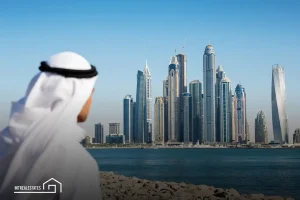Have you ever wondered how a small city in the heart of the desert transformed into one of the world’s largest economic and commercial hubs? Dubai’s economy is an astonishing story of transformation and progress, growing from a simple fishing village into a modern metropolis at an incredible pace. Studying this article will help you gain a deep understanding of the driving forces behind this dynamic economy and familiarize yourself with its future prospects. If you’re looking for unparalleled investment opportunities in this city, intrealestates will be your guide, offering various types of properties in Dubai, including apartments, townhouses, penthouses, shops, commercial properties, and off-plan properties.
Dubai’s Economy: A Driving Force for Regional and Global Growth
Dubai’s economy is no longer reliant on oil. While oil played a significant role in the city’s initial development, today its contribution to Dubai’s Gross Domestic Product (GDP) is less than 1%. This remarkable transformation is the result of years of strategic planning and intelligent economic diversification, which has made Dubai one of the most dynamic business and financial centers in the world. Below, we’ll delve deeper into the main drivers of this economy.
Main Drivers of Dubai’s Economy
Dubai’s economy is propelled by several key sectors, each playing a crucial role in its growth and dynamism:
1. Tourism: An Attraction for Millions
Dubai has become a global tourist destination, attracting millions of visitors annually. This sector’s contribution to Dubai’s GDP reached 20% in 2024, indicating its increasing importance. From luxury hotels like the Burj Al Arab to massive shopping centers such as the Dubai Mall, and unique architectural icons like the Burj Khalifa and Palm Jumeirah, all have contributed to the prosperity of this industry. International events like the Dubai Shopping Festival and Expo 2020 have also placed Dubai in the global spotlight.
2. Real Estate: The Beating Heart of Investment
The real estate sector is one of the main pillars of Dubai’s economy, generating billions of dollars in revenue. World-class infrastructure and a luxurious lifestyle attract wealthy investors from around the globe, especially from China, India, Russia, and Europe, to this market. The absence of property tax and the presence of major companies like Emaar (developer of Burj Khalifa) and Nakheel (known for the Palm Jumeirah islands) have led to unprecedented growth in this market. If you’re looking to buy property in Dubai or invest in this sector, you can find a variety of options. The increase in real estate transactions, particularly with the influx of Russian investors in recent years, attests to the dynamism of this sector. For information on the minimum property prices in Dubai and to view the latest projects, please contact our consultants.
3. Trade and Financial Services: Regional and Global Hub
Dubai is recognized as an international business hub and a regional and global financial center. The Dubai International Financial Centre (DIFC), alongside Jebel Ali Port, the world’s largest artificial deep-water port, plays a vital role in global transportation. Dubai is also a major center for diamond and gold trading. A 35% growth in Foreign Direct Investment (FDI) in Dubai’s financial sector in Q1 2024 demonstrates high global confidence in the city’s stability and rule of law. The FinTech sector has also seen significant growth, with over 1,000 companies since 2017.
4. Transport and Logistics: The Economy’s Lifeline
This sector accounted for the second-largest share, 12.3%, of Dubai’s GDP in 2018. Emirates Airline connects Dubai to over 150 destinations worldwide, boosting tourism, trade, and business travel. The Roads and Transport Authority (RTA) also generates billions in revenue by managing the metro, buses, and taxis.
5. Information and Communication Technology (ICT) and Innovation: A Glimpse into the Future
Dubai is rapidly becoming a technology and innovation hub in the region. Cities like Dubai Internet City and Dubai Media City host prominent technology companies and media organizations. The focus on attracting high-value engineers and establishing Artificial Intelligence (AI) centers demonstrates the Dubai government’s seriousness in embracing new technologies and aiming to be 10 years ahead in this field.
6. Industry and Manufacturing: Modernization and Sustainability
Traditional sectors like manufacturing are also undergoing digitalization and modernization. The focus on a green economy, including the use of solar energy, reflects Dubai’s commitment to sustainability. Companies like Emirates Global Aluminium play an important role in this sector.
Financial Policies and Revenue Sources
Dubai’s tax policies make it an attractive global hub for professionals and businesses. Despite zero personal income tax, the Dubai government secures its revenues through indirect taxes and fees:
- Value Added Tax (VAT): 5% on most goods and services since 2018.
- Corporate Tax: 9% on business profits exceeding AED 375,000 starting in 2023.
- Customs Duties: 5% on imports.
- Fees and Licenses: Including real estate transaction fees (4%), Salik tolls on roads, and business and residency permit fees.
- Tourism Fees: Including a tourism dirham fee per night of hotel stay and a 5% municipal tax on services.
Government-owned companies such as Emirates Airline, RTA, DP World, Dubai Electricity and Water Authority (DEWA), Etisalat, and Du also generate billions of dollars in annual revenue.
Strategic Planning and Future Outlook of Dubai’s Economy
Through long-term and strategic planning, Dubai aims to solidify its position as a global economic and commercial center. The D33 Agenda, which aims to double the size of Dubai’s economy by 2033 and transform it into one of the top three places to live globally, is a prime example of this vision. The focus on developing non-oil sectors, technology, the green economy, and smart cities, along with attracting talent and foreign investment, are key objectives of this planning. The rapid speed of market entry and massive investments in infrastructure, including plans to increase urban capacity for an additional one million people in the next 10 years, demonstrate Dubai’s strong determination for sustainable growth.
Challenges Facing Dubai’s Economy
Despite remarkable progress, Dubai also faces challenges: reliance on tourism and real estate services, global competition with other financial centers, rising housing prices and concerns about a price bubble, environmental issues, and the impacts of the COVID-19 pandemic. However, the Dubai government, through careful oversight, new regulations, and necessary measures to comply with international regulatory standards (in response to money laundering allegations), is striving to turn these challenges into opportunities.
Conclusion: A Bright Future for Dubai’s Economy
Dubai’s economy is a prime example of transformation, diversification, and intelligent growth. This city has moved beyond its oil-based roots and, by focusing on tourism, real estate, trade, financial services, and technology, has become one of the world’s most dynamic economies. Strategic planning, attracting foreign investment, and infrastructure development have set a bright future for this city. If you are looking for a secure and profitable investment and want to capitalize on the unparalleled opportunities of Dubai’s economy, we at intrealestates offer a wide range of properties, including apartments for sale in Dubai, penthouses in Dubai, and townhouses in Dubai. For a free consultation and to learn about available options, contact our expert consultants today.












